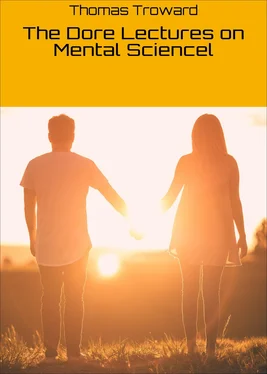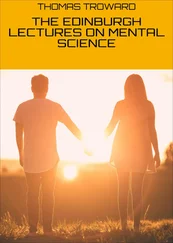spontaneously within him.
He then finds himself to be as the Bible says, "the image and
likeness of God." He has reached the level at which he affords a
new starting point for the creative process, and the Spirit,
finding a personal centre in him, begins its work de nova, having
thus solved the great problem of how to enable the Universal to
act directly upon the plane of the Particular.
It is in this sense, as affording the requisite centre for a new
departure of the creative Spirit, that man is said to be a
"microcosm," or universe in miniature; and this is also what is
meant by the esoteric doctrine of the Octave, of which I may be
able to speak more fully on some other occasion.
If the principles here stated are carefully considered, they will
be found to throw light on much that would otherwise be obscure,
and they will also afford the key to the succeeding essays.
The reader is therefore asked to think them out carefully for
himself, and to note their connection with the subject of the
next article.
Individuality is the necessary complement of the Universal
Spirit, which was the subject of our consideration last Sunday.
The whole problem of life consists in finding the true relation
of the individual to the Universal Originating Spirit; and the
first step towards ascertaining this is to realize what the
Universal Spirit must be in itself. We have already done this to
some extent, and the conclusions we have arrived at are:--
That the essence of the Spirit is Life, Love, and Beauty.
That its Motive, or primary moving impulse, is to express the
Life, Love and Beauty which it feels itself to be.
That the Universal cannot act on the plane of the Particular
except by becoming the particular, that is by expression through
the individual.
If these three axioms are clearly grasped, we have got a solid
foundation from which to start our consideration of the subject
for to-day.
The first question that naturally presents itself is,
If these things be so, why does not every individual express the
life, love, and beauty of the Universal Spirit? The answer to
this question is to be found in the Law of Consciousness. We
cannot be conscious of anything except by realizing a certain
relation between it and ourselves. It must affect us in some way,
otherwise we are not conscious of its existence; and according to
the way in which it affects us we recognize ourselves as standing
related to it. It is this self-recognition on our own part
carried out to the sum total of all our relations, whether
spiritual, intellectual, or physical, that constitutes our
realization of life. On this principle, then, for the REALIZATION
of its own Livingness, the production of centres of life, through
its relation to which this conscious realization can be attained,
becomes a necessity for the Originating Mind. Then it follows
that this realization can only be complete where the individual
has perfect liberty to withhold it; for otherwise no true
realization could have taken place. For instance, let us consider
the working of Love. Love must be spontaneous, or it has no
existence at all. We cannot imagine such a thing as mechanically
induced love. But anything which is formed so as to automatically
produce an effect without any volition of its own, is.nothing but
a piece of mechanism. Hence if the Originating Mind is to realize
the reality of Love, it can Only be by relation to some being
which has the power to withhold love. The same applies to the
realization of all the other modes of livingness; so that it is
only in proportion, as the individual life is an independent
centre of action, with the option of acting either positively or
negatively, that any real life has been produced at all. The
further the created thing is from being a merely mechanical
arrangement, the higher is the grade of creation. The solar
system is a perfect work of mechanical creation, but to
constitute centres which can reciprocate the highest nature of
the Divine Mind, requires not a mechanism, however perfect, but a
mental centre which is, in itself, an independent source of
action. Hence by the requirements of the case man should be
capable of placing himself either in a positive or a negative
relation to the Parent Mind, from which he originates; otherwise
he would be nothing more than a clockwork figure.
In this necessity of the case, then, we find the reason why the
life, love, and beauty of the Spirit are not visibly reproduced
in every human being. They ARE reproduced in the world of nature,
so far as a mechanical and automatic action can represent them,
but their perfect reproduction can only take place on the basis
of a liberty akin to that of the Originating Spirit itself, which
therefore implies the liberty of negation as well as of
affirmation.
Why, then, does the individual make a negative choice? Because he
does not understand the law of his own individuality, and
believes it to be a law of limitation, instead of a Law of
Liberty. He does not expect to find the starting point of the
Creative Process reproduced within himself, and so he looks to
the mechanical side of things for the basis of his reasoning
about life. Consequently his reasoning lands him in the
conclusion that life is limited, because he has assumed
limitation in his premises, and so-logically cannot escape from
it in his conclusion. Then he thinks that this is the law and so
ridicules the idea of transcending it. He points to the sequence
of cause and effect, by which death, disease, and disaster, hold
their sway over the individual, and says that sequence is law.
And he is perfectly right so far as he goes--it is a law; but not
THE Law. When we have only reached this stage of comprehension,
we have yet to learn that a higher law can include a lower one so
completely as entirely to swallow it up.
The fallacy involved in this negative argument, is the assumption
that the law of limitation is essential in all grades of being.
It is the fallacy of the old shipbuilders as to the impossibility
of building iron ships. What is required is to get at the
PRINCIPLE which is at the back of the Law in its affirmative
working, and specialize it under higher conditions than are
spontaneously presented by nature, and this can only be done by
the introduction of the personal element, that is to say an
individual intelligence capable of comprehending the principle.
The question, then, is, what is the principle by which we came
into being? and this is only a personal application of the
general question, How did anything come into being? Now, as I
pointed out in the preceding article, the ultimate deduction from
physical science is that the originating movement takes place in
the Universal Mind, and is analogous to that of our own
imagination; and as we have just seen, the perfect ideal can only
be that of a being capable of reciprocating ALL the qualities of
the Originating Mind. Consequently man, in his inmost nature, is
the product of the Divine Mind imaging forth an image of itself
on the plane of the relative as the complementary to its own
sphere of the absolute.
If we will therefore go to the INMOST principle in ourselves,
which philosophy and Scripture alike declare to be made in the
Читать дальше









![John Bruce - The Lettsomian Lectures on Diseases and Disorders of the Heart and Arteries in Middle and Advanced Life [1900-1901]](/books/749387/john-bruce-the-lettsomian-lectures-on-diseases-and-disorders-of-the-heart-and-arteries-in-middle-and-advanced-life-1900-1901-thumb.webp)


